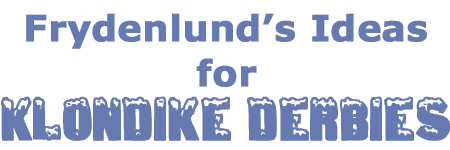
Klondike Organization
Elements:
There are four basic organizer controlled elements that create the flavor of the Derby. They are the Structure, the Sleds, the Gear. and the Events. Out of organizer control are the weather and the terrain. How these six elements interact strongly influence what works and what fails. Some combinations work well, some so-so, and some are most likely to fail.
Structure:
There are three common forms for structuring the overall event. They are; 1) free form locations and event order, 2) a circuit where events are done in the order of the route, and 3) hub and spoke where teams are dispatched from a central control point to events and return when done to be sent to another. Usually, but not always, one or more events are clustered in "towns" named for a Yukon or Alaskan town important during the Gold Rushes.
Small Derbies (geography and body count) tend to use free form and tend to not use the town concept. Larger Derbies favor circuits or hub and spoke depending on custom and terrain. It should not be a surprise that if a Derby is held at a Scout camp that is organized as spokes around a central core its Derby would put towns in the camp sites and be organized as a hub and spoke. A camp with the camp sites off a perimeter road would probably opt for a circuit.
All other things being equal, the advantage of hub and spoke is that bottlenecks and pileups are less likely when an event breaks down or runs longer than expected. Teams are dispatched to towns with little or no waiting. It is also easy to have a common lunch time and place. The advantage of circuit is that it seems more like a trip. It feels less artificial.
Whether run as circuit or hub and spoke, some Derbies use the transit between towns as a Grand Race. Teams are time stamped out of each stop and time stamped in at the next stop. The sum of the elapsed time on transits constitutes the race time and the shortest time wins.
Small Derbies tend to use head to head sled races at the end. If these are done as a series of heats they buy time for the events to tabulated and winners determined. The end of the races is the start of the awards ceremony.
Smart organizers build their towns so that the time spent in a particular town is about equal to the time spent in another. One town may have one long event while another town has three short events. Some argue vigorously that hard to score events should be early while easy to score events should be later so there is less delay at the end in figuring out winners. These issues are most important in circuits.
Sleds:
Sleds range from none (might just as well be a camporee), to anything goes (including store bought), to lightly specified (length, width, weight and runner type), to tightly specified (dimensions, materials, fasteners, waxing). Some require "built by the patrol actually participating" (no previous year sleds). Others allow legacy sleds. The choice is usually a balance between tradition, organizer temperament, and expense. Obviously sled races are more fair with identical sleds. No one, in my experience, has yet come up with a successful handicap system for sleds. Also event design is easier if the sleds are alike. One can incorporate the sleds into events. It is possible to design a good event for transporting a sled across a gully with ropes if you know what the sleds are like. It may be difficult or impossible to do that if the sleds range from toboggans to commercial tub sleds to two runner dog sleds. Some Derbies start with the teams assembling/building their competition sled...
Gear:
Some Derbies issue a gear list that includes everything for all events and all this gear must be stowed on the sled. Some issue a gear list with core gear that the patrol will be assumed to have and supplemental gear will be available at events. Some Derbies with gear lists have an inspection station where Mounties check all their gear (like was really done in the Yukon) and invert and shake the sled to insure that all the gear is properly fastened. Some Derbies provide everything needed at each event and have no gear requirement.